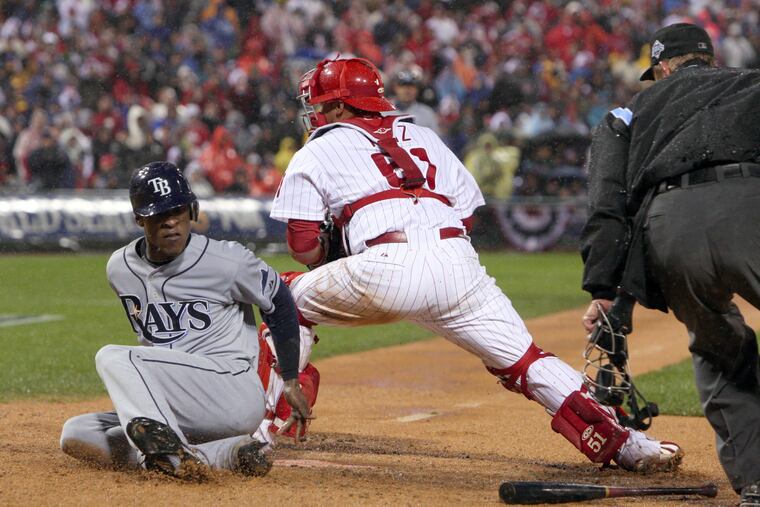The weather fiasco the last time the Phillies won it all prompted an MLB rule change
The 2008 Game 5 fiasco in Philly led to a change in Major League Baseball's postseason weather policies.

Come nor’easter or high water, if weather interrupts a World Series game at Citizens Bank Park this week — regardless of the inning, the score, or who is batting — it will resume under the same circumstances and played to completion in Philly, no matter how many days it takes the atmosphere to cooperate.
That decree by Major League Baseball, which applies to all postseason games, may seem like an exercise in common sense. But it took 106 years for MLB to enact that rule, and it had everything to do with the all-time fiasco that was Game 5 of the 2008 fall classic, in which the Phillies won their last championship.
Baseball was unprepared for the unprecedented circumstances that unfolded on that Monday night in 2008.
» READ MORE: Phillies-Astros World Series Game 3 might be a poncho situation, but any rain delay looking unlikely
The rain
The Phillies, leading the series over the Tampa Bay Rays, 3-1, had their ace, Cole Hamels, on the mound when the game started at 8:30 p.m. on Oct. 27, and they staked him to a 2-0 lead on an RBI single by Shane Victorino.
It got worse from there, however, for the players on both teams, and the 45,000-plus in the stands. A nor’easter was developing off the coast, and light rain at the start of the game became steadier and heavier. The temperature had dropped to 41 degrees by 9 p.m., and then to 40.
“The conditions around the plate were real bad,” Phillies catcher Carlos Ruiz said after the game. “It was real bad for the hitter, real bad for me, and for everybody. It was hard to feel the ball in your hand.”
Through five innings the Phillies led, 2-1, and the game became “official.” After Tampa Bay tied it in the top of the sixth, the umpires decided the field no longer was playable and sent the teams to their clubhouses.
Under baseball rules, although the game was tied, if the umpires declared it over at that point, the Phillies would have won since the Rays’ runs wouldn’t have counted until the Phils had their turn to bat in the sixth.
But this was the World Series, and never since it began in 1903 had a team won in a rain-shortened World Series game. Then-Commissioner Bud Selig, who was at the ballpark and had made the decision to start the game, decreed that the game was suspended — not ended, and would be resumed when weather permitted.
In this case that didn’t happen until two nights later, when the Phils won it all with a 4-3 victory.
» READ MORE: Phillies-Astros Game 3: Start time, channel, how to watch and stream the World Series
The commissioner speaks
At a news conference late on that Monday night, Selig was grilled by reporters, who wanted to know why the game had been allowed to start in the first place.
He blamed meteorologists for under-forecasting the intensity of the rain. He said that, based on the forecasts from three unidentified weather services used by the Phillies, officials from both teams and the umpires agreed that the game should be played.
Dave Montgomery, the Phillies’ owner at the time, was known to consult the National Weather Service. The forecast it issued at 3:26 p.m. that day called for a 90% chance of “occasional rain” at night, and it said that intensity could pick up toward midnight.
Selig said the weather folks were calling for about a tenth of an inch of rain, and he quoted the Phillies’ head groundkeeper as saying: “‘Commissioner, don’t worry. We can handle that. That’s nothing.’”
He acknowledged that nothing in the rule book spoke to the circumstances that night, and that the suspension call was all his.
“I guess putting everything else aside, it’s my judgment,” he said.
What resulted was a rule change, approved by team owners in January 2009. It stated that all postseason games, if interrupted, would be considered “suspended” and “played to completion at the same site.”
May it not need to be invoked in 2022.
» READ MORE: Her job is using numbers to give the Astros an edge. But this baseball exec grew up in Philly.
Talk about long delays ...
Here are the longest World Series delays. The Phillies-Rays series would be No. 6 on this list. It was the only one that was halted while a game was in progress.
2001: New York Yankees at Arizona Diamondbacks. The start of the series was pushed back a week, to Oct. 27, after the Sept. 11 attack.
1989: Oakland Athletics at San Francisco Giants. Game 3 was postponed 10 days (Oct. 17 to 26) due to an earthquake.
1975: Cincinnati Reds at Boston Red Sox. Game 6 was postponed three days (Oct. 18 to 20) due to rain.
1962: New York Yankees at San Francisco Giants. Game 6 pushed back three days (Oct. 12 to 14) due to rain.
1911: New York Giants at Philadelphia Athletics. Game 4 postponed six days (Oct. 18 to 23) due to rain.